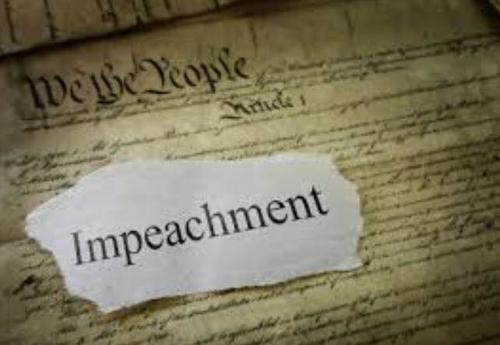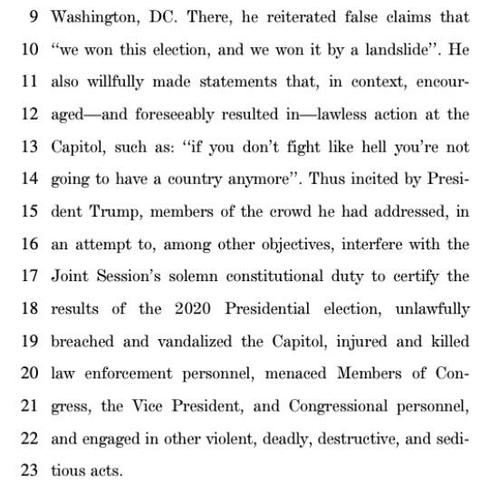Below is my column in the Hill newspaper on my concerns over the planned “snap impeachment” this year. In my view, impeaching on the speech alone would raise serious concerns over the use of impeachment in the future. Many Democrats, including members of Congress, refused to accept Trump as the legitimate president when he was elected and refused to do so as rioting broke out at the inauguration. Many of the same members have used the same type of rhetoric to “take back the country” and “fight for the country.”
The concern is that this impeachment will not only create precedent for an expedited pathway of “snap impeachments” but allow future Congresses to impeach presidents for actions of their supporters. The point of this column is to call for greater caution and deliberation before we take this step to consider the basis and implications of this impeachment. As with the calls to use the 25th Amendment, there are real dangers to any opportunistic or hurried use of this option. There is also the alternative of a joint and bipartisan condemnation of both houses, which would be both justified and unassailable.
As I have said, there could be evidence to support impeachment on the proposed incitement article but it would have to be found before or after the speech to show an intent to spark rioting or to allow it to continue. As with the 25th Amendment claim, such evidence would be found from within the White House and through a traditional impeachment inquiry.
Here is the column:
Author Franz Kafka once wrote, “My guiding principle is this: Guilt is never to be doubted.” Congressional Democrats appear close to adopting that Kafkaesque standard into the Constitution as they prepare for a second impeachment of President Trump.
In seeking his removal for “incitement,” Democrats would gut not only the impeachment standard but free speech, all in a mad rush to remove Trump just days before the end of his term.
Democrats are seeking to remove Trump on the basis of his speech to supporters before the Jan. 6 rioting at the U.S. Capitol. Like many, I condemned that speech as it was still being given, calling it reckless and wrong. I also opposed the challenges to electoral votes in Congress. However, Trump’s speech does not meet the definition of incitement under the U.S. criminal code. Indeed, it would be considered protected speech by the Supreme Court.
When I testified in both the Clinton and Trump impeachment hearings, I noted that an article of impeachment does not have to be based on a clear crime but that Congress historically has looked to the criminal code to weigh impeachment offenses. In this current controversy, any such comparison would quickly dispel claims of criminal incitement. Despite widespread, justified condemnation of his words, Trump never actually called for violence or a riot. Rather, he urged his supporters to march on the Capitol to express opposition to the certification of electoral votes and to support the challenges being made by some members of Congress. He expressly told his followers “to peacefully and patriotically make your voices heard.”
Such electoral-vote challenges have been made by Democrats in past elections under the Electoral Count Act, and Trump was pressing Republican lawmakers to join the effort on his behalf. He stated:
“Now it is up to Congress to confront this egregious assault on our democracy…And after this, we’re going to walk down – and I’ll be there with you – we’re going to walk down … to the Capitol and we’re going to cheer on our brave senators and congressmen and women.”
He ended his speech by saying a protest at the Capitol was meant to “try and give our Republicans, the weak ones … the kind of pride and boldness that they need to take back our country. So let’s walk down Pennsylvania Avenue.” Such marches are common — on both federal and state capitols — to protest or to support actions occurring inside.
The governing legal standard for violent speech is found in Brandenburg v. Ohio. As a free speech advocate, I have long criticized that 1969 case and what I consider its dangerously vague standard. However, even Brandenburg would treat Trump’s speech as protected by the First Amendment. Under that case, the government can criminalize speech that is “directed to inciting or producing imminent lawless action and is likely to incite or produce such action.”
There was no call for lawless action by Trump. Instead, there was a call for a protest at the Capitol. Moreover, violence was not imminent; the vast majority of the tens of thousands of protesters present were not violent before the march, and most did not riot inside the Capitol. Like many violent protests we have witnessed over the last four years, including Trump’s 2017 inauguration, the criminal conduct was carried out by a smaller group of instigators. Capitol police knew of the planned march but declined an offer of National Guard personnel because they did not view violence as likely.
Thus, Congress is about to seek the impeachment of a president for a speech that is protected under the First Amendment. It would create precedent for the impeachment of any president who can be blamed for the violent acts of others after the use of reckless or inflammatory language.
What is even more unnerving are the few cases that would support this type of action. The most obvious is the 1918 prosecution of socialist Eugene Debs, who spoke passionately against the draft in World War I and led figures like President Wilson to declare him a “traitor to his country.” Debs was arrested and charged with sedition, the new favorite term of today’s Democratic leaders to denounce Trump and Republican members who challenged the Biden victory.
In 1919, Justice Oliver Wendell Holmes wrote for a unanimous bench in one of the most infamous decisions to issue from the Supreme Court. The court dismissed Debs’ free speech rights and held that it was sufficient that his words had the “natural tendency and reasonably probable effect” of deterring people from supporting the war.
That decision was a disgrace — but Democrats are now arguing something even more extreme as the basis for impeachment. Under their theory, any president could be removed for rhetoric deemed to have the “natural tendency” to encourage others to act in a riotous fashion. Even a call for supporters to protest peacefully would not be a defense. It would be as if Debs first denounced the war but also encouraged people to enlist. This standard would allow for a type of vicarious impeachment — attributing conduct of third parties to a president for the purposes of removal.
Democrats are pushing this dangerously vague standard while objecting to their own statements being given incriminating meaning by critics. For example, conservatives have pointed to Rep. Maxine Waters (D-Calif.) calling for people to confront Republican leaders in restaurants; Rep. Ayanna Pressley (D-Mass.) insisted during 2020’s violent protests that “there needs to be unrest in the streets,” while then-Sen. Kamala Harris (D-Calif.) said “protesters should not let up” even as many protests were turning violent. They can all legitimately argue that their rhetoric was not meant to be a call for violence, but this is a standard fraught with subjectivity.
The damage caused by this week’s rioting was enormous — but it will pale in comparison to the damage from a new precedent of a “snap impeachment” for speech protected under the First Amendment. It is the very danger that the Framers sought to avoid in crafting the impeachment standard. In a process meant to require deliberative, not impulsive, judgments, the very reference to a “snap impeachment” is a contradiction in constitutional terms. In this new system, guilt is not to be doubted and innocence is not to be deliberated. It would do to the Constitution what the rioters did to the Capitol: Leave it in tatters.









